
However, that problem can be kept under control with the best humidifier for sinus problems. When the air is dry, your sinuses become congested, and it is very difficult to breathe. The only way to fix this issue is by bringing the air at a decent humidity level.
Still, finding a good humidifier for sinus infection can be very tricky – particularly considering how many options you have out there. While most humidifiers are helpful when it comes to treating this problem, some are still more convenient than others. Keep reading and you will find out how.
Best Humidifier for Sinus Problems Comparison Chart
| PRODUCT | DETAILS | ||
|---|---|---|---|
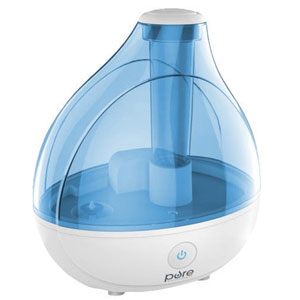 | Pure Enrichment MistAire Ultrasonic Cool Mist Humidifier |
| View On Amazon |
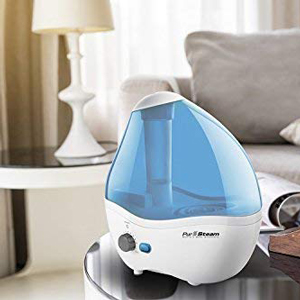 | Cool Mist Humidifier – Superior Ultrasonic |
| View On Amazon |
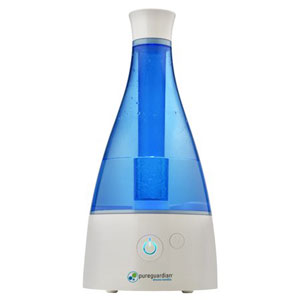 | PureGuardian H940 Ultrasonic Cool Mist Humidifier |
| View On Amazon |
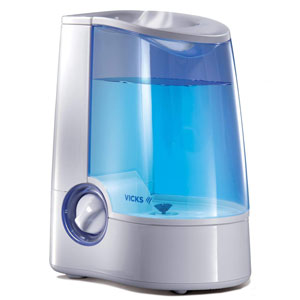 | Vicks Warm Mist Humidifier |
| View On Amazon |
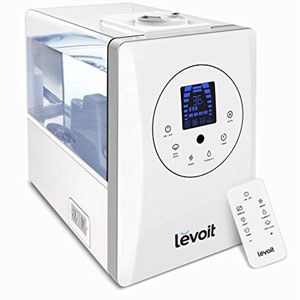 | LEVOIT Warm and Cool Mist Ultrasonic Humidifier |
| View On Amazon |
Why You Should Be Using an Air Humidifier for Sinusitis
Low humidity levels are bad for your sinuses. When the air outside is dry, your sinus mucus will become hardened and congested – therefore leading to chronic sinus pain and inflammation.
Under normal conditions, our nose features a special mechanism that will clear the air passing through it. However, when the air is too dry, the mucus cannot cope with it. As a result, you get congested, and you’re left with facing irritation and allergies.
For many people, sinus problems occur at night, when our bodies enter “sleep mode.” This will cause your sleep to be disruptive – setting you on the path for other medical concerns.
However, humidifiers can provide relief from sinus infections by sending moisture into the air. This will prevent your mucus from hardening – therefore minimizing the congestion effect. As a result, your sinuses will function properly, with a nice and proper flow.
Overall, here is a list with the main benefits brought by a humidifier for sinus problems:
- Better sleep
- Easier to breathe
- It reduces the risks of allergies, sinus, or asthma attacks
- Fewer nosebleeds
- Throat and nasal congestion relief
- No more dry mouth
- Moisturized skin
Plus, not only will you be the one benefiting from a humidifier, but your houseplants and furniture might appreciate it too.
How to Tell If the Air Is Too Dry
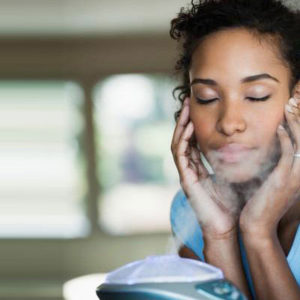
Dry air is the perfect place for allergens to go crazy – mainly because they are lighter in this environment. Because of this, they’ll be “floating” more often in the air – making their way into our respiratory system and aggravating any condition we might have.
The best way to determine if the air is too dry is by getting a hygrometer. This way, you can get an accurate read of the humidity levels. If they’re under 30%, then the humidity is too low.
Bear in mind that a humidity level is too high is not a good option either. If it goes past 50%, you no longer need a humidifier; you need a dehumidifier. And if your air is polluted, you need an air purifier. The best news is that we at Humidity Expert have reviewed products from all the groups and our guides are available for you to read.
If you don’t have a hygrometer, then you might “diagnose” the dryness in the air by the following symptoms:
- Dry skin
- Dry throat, mouth, and nosebleeds – especially in the mornings
- Continuously runny nose
- Static body electricity (e.g. hair standing up after you pass a brush through it)
If you have experienced any of the above-mentioned symptoms, then you need to invest in a humidifier – because news flash: the air is too dry.
Humidifier Categories for Sinus Problems
Humidifiers for sinusitis come in various shapes and sizes, depending on your preferences and use. Overall, here is what you may come across:
Whole House Humidifiers
When sinusitis is a common occurrence, you may want to make sure every room in your home is at a decent humidity level. Some of the best whole house humidifiers can be attached to the supply line or the furnace – so that your entire house gets the humidity that it needs.
Single Room Humidifiers
Let’s say that you only use one room of the house – or you are just living in a one-room apartment. In this case, you probably won’t need a whole-house humidifier. That might just be overkill.
These units are generally smaller – and less expensive than your average whole-house model. These warm mist humidifiers were also made to be portable to fit in small rooms, in case you might want to humidify another room – other than the one you often use.
Travel Humidifiers
If you go on a trip, this does not mean that your allergies will stay home – which is why you need to invest in the most popular travel humidifiers. These devices generally fit in the palm of your hand – and are attached to disposable bottles of water. This way, you can fit them in your luggage and you will not have to worry about sinus infections.
Types of Humidifiers
Each category of humidifiers branches down into several other types. Some are more modern and expensive, others are simple and affordable. It will generally depend on the features that you want to have – but also on the effect that you want to get.
Cool Mist Humidifiers
Cool mist humidifiers are also referred to as “evaporative wick” humidifiers, and they work by sending a cool mist in the air that is invisible to the naked eye. With these units, the dried air is sucked into the humidifier’s system, passing it through a wick filter.
The moisture is then evaporated by a fan into the air while the sediments and other impurities are trapped within the filter. This is why this type of humidifier is such a great option for sinus problems – because the resulted air is as clean as it can get.
These humidifiers are also a perfect option for larger rooms set in an arid climate. The cool mist will chill down the air – sometimes even taking away the need for air conditioning. If you experience hot, dry days during summer, then you might want to invest in such a unit – for the sake of your sinuses.
Warm Mist Humidifiers
A good warm mist humidifier will produce a soothing, warm mist that is perfect for cold winter temperatures. During these times, the air is generally harsh and dry – causing your sinuses to go haywire. This is why this humidifier provides such great comfort.
The mist for these units is a result of a boiling process – a gentle one that has the purpose of trapping the impurities and killing off the bacteria. Once that has been done, the humidifier will release the warm and clean vapors into the air – raising the room’s humidity level.
Most of these humidifiers will feature a humidistat that will tell you precisely the room’s humidity level. It will also allow you to set it at a certain level – so if you prefer your room to be at 45% humidity, then you can manually choose this option.
Some of these models also come with medicine cups where you can add sinus medicine. However, if they do not come with the cup, you can easily add it to the water tank. Just make sure that it is water-soluble.
Ultrasonic Humidifiers
Ultrasonic humidifiers are among the most modern products – and also the most sought options. These units use a transducer that vibrates the water, breaking it down at ultrasonic speed. The result is a pure, light, refreshing mist that will humidify the entire room.
Thanks to this vibration technology, ultrasonic humidifiers are also very quiet – making them very popular among people who want to use these units at night. Generally, you won’t even hear the sound of gurgling water – the only thing giving it away being the LED indicator lights.
They are also very low-maintenance and generally bacteria-free – which is why so many people consider every model to be a great humidifier for a sinus infection.
Vaporizers
Like warm mist humidifiers, vaporizers also produce a soothing, warm vapor – as a means of a boiling process. This process will remove any impurities found in the water – which is why the resulted mist is clean and perfect for people with sinus problems.
These humidifiers are among the most affordable options, which is why they are the preferred choice for those shopping on a budget. They do not feature a removable tank – but they are quite easy to clean and maintain.
Factors to Consider When Buying a Humidifier for Sinus Problems
If you are one of those unlucky people suffering from sinus problems, then you need to consider some factors when looking for a humidifier. These are not always specified in the product description – which is why you may want to read a few reviews before making your purchase. Here is what you need to keep an eye out for.
Filtering Properties
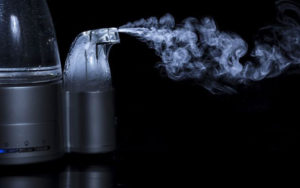
Most ultrasonic humidifiers do not have filters, so you may want to ensure that yours does have one. This way, you will prevent the harmful minerals and dust from being released into the air – and going straight to your sinuses.
Warm mist humidifiers are generally a suitable choice since the boiling process will trap and kill the bacteria before it is released. Plus, since all of them generally have filters, the air will be nice and clean.
However, in order for the unit to be as effective as possible, you need to clean it as often as you can – and not just every once in a while. It needs to go through a deep cleanse at least once a week.
Maintenance
When you are suffering from allergies and sinus problems, the last thing you want to deal with is a humidifier that takes ages to clean. If the unit is dirty, it becomes the perfect breeding ground for bacteria, mold, and other organisms that can cause your sinuses to go haywire. As a result, whenever you clean your unit, you risk aggravating your sinus problems.
Look for humidifiers that have large openings to their water tanks, since this will allow you to easily wipe your humidifier clean. You should also make sure that the other parts are dismantled easily and that you can place them in the dishwasher. The less contact you have with the allergens, the better.
Diffusion Functionality
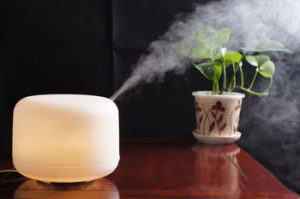
Some of these humidifiers have special medicine cups from where the unit pulls the medicine. However, most of the time, you can add it directly to the water. Just make sure that what you are adding is water-soluble and it will not clog the humidifier.
Size of the Room
When you are allergic to something in the air, the chances are that your allergy will bother you when you are not standing right next to the humidifier. So, make sure you get a unit that is also effective in a larger room.
Ease of Use

For the sake of your nerves and your sinus health, look for a unit that can be easily operated – even if you decide to turn it on in the middle of the night.
- Automation
When it comes to humidifiers, there are two options from which you can pick: you can go for a manual model, or you can go for an automated one. Manual humidifiers are generally the least expensive since the owner will have to do most of the work – while keeping an eye on the water tank.
On the other hand, automated humidifiers represent a more convenient option if you don’t want to spend your day stalking your humidifier. First of all, these units will generally analyze the air and send only as much humidity as you need to keep the air healthy.
Secondly, automated units have an automated shut-off feature. This means that if the water tank runs out of the water, the unit will close itself automatically – therefore preventing it from overheating.
Wrap Up
Sinus problems are messy, and the truth is that not every humidifier is perfect for clearing up this condition. Granted, humidity plays a big role in preventing your sinuses from going crazy, as it softens your mucus. However, there are many other things to consider – such as the unit’s filtering ability.
Finding the best humidifier for sinus problems may take some time – but as long as you are thorough with your research, you should be able to find something right up your alley. You may also want to read as many reviews as possible from users going through the same problems as you are.
Hopefully, this guide gave you a few ideas on what you should look for in a humidifier for sinus infections. Just remember that proper humidity levels and clean air will make your sinuses “happy”.
Leave a Reply